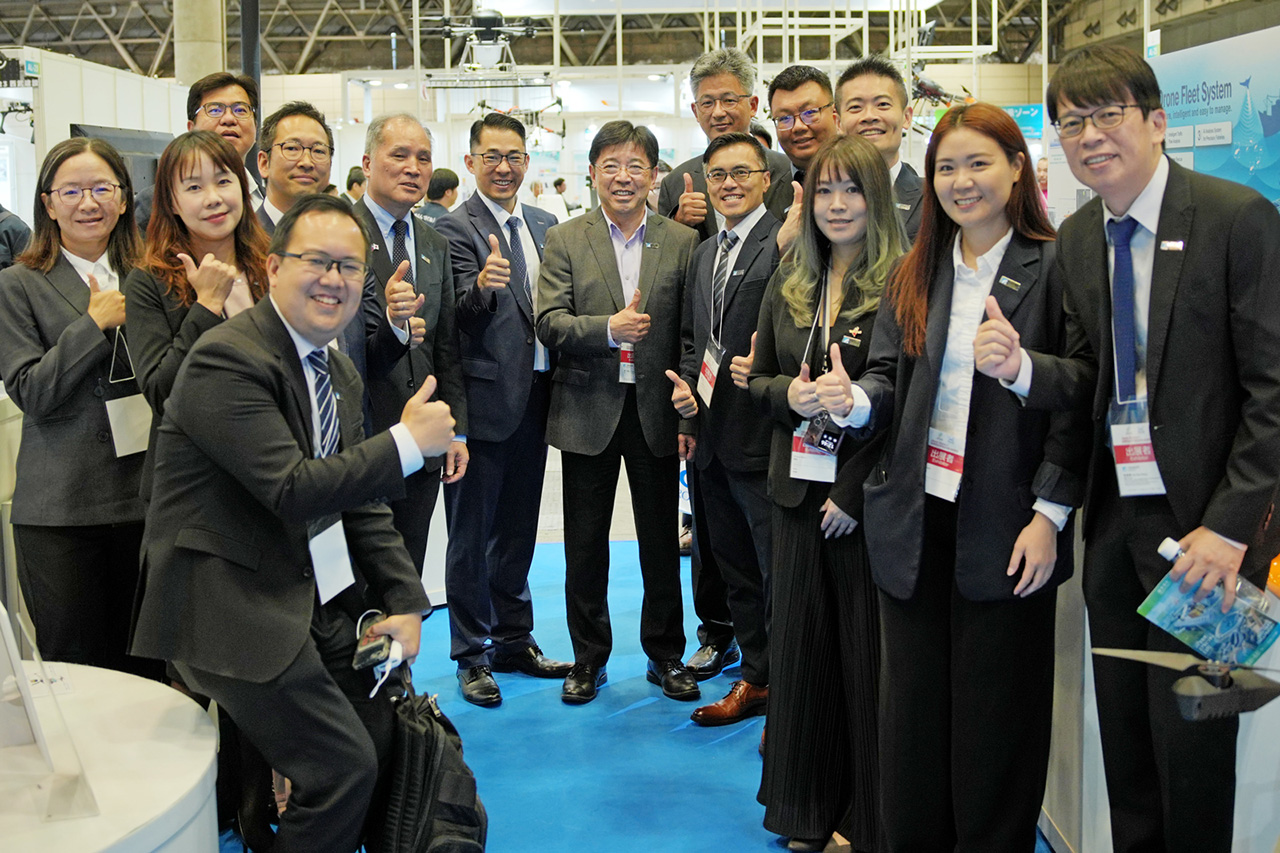Activity
Japan Drone 2025: Fostering Taiwan-Japan Tech Cooperation and Industrial Ties
At Japan Drone 2025, ITRI showcased six innovative drone technologies in the Taiwan Pavilion, which was led by the Taiwan Excellence Drone International Business Opportunities Alliance (TEDIBOA). The innovations were built for high-value application markets such as inspection and logistics, helping link Taiwan’s supply chain with global buyers and the Japanese market.
During the exhibition, ITRI organized a delegation to visit the Japan UAS Industrial Development Association (JUIDA), along with ten leading Japanese companies in drone services, electric vertical take-off and landing (eVTOL), and logistics drone development. These visits aimed to explore collaborations in technology licensing, joint R&D, and application integration, deepening the partnership between Taiwan and Japan in building an autonomous drone supply chain.

ITRI Team at Japan Drone 2025.
“ITRI is committed to aligning with industry needs and assisting TEDIBOA’s global expansion by developing key drone technologies and tapping into international markets,” said ITRI President Edwin Liu. “Taiwan has already attracted foreign firms to build supply chains locally, including one of the global top five drone manufacturers Parrot and Japan’s biggest drone company ACSL.”
ITRI’s presence at Japan Drone, which is Asia’s most influential drone exhibition, followed its showcase earlier this year at XPONENTIAL Europe, Europe’s leading trade show for uncrewed systems and robotics. With Japan actively fostering a self-reliant drone supply chain, this exhibition offers not only a platform to demonstrate Taiwan’s technological strengths but also a catalyst for deepening Taiwan-Japan industrial cooperation.
At this exhibition, ITRI presented six innovative drone technologies involving full systems and key modules. Three full systems solutions are tailored to advanced applications such as inspection, logistics, and special missions.
First, its Long-Endurance Fuel Cell Drone, powered by hydrogen fuel cells, achieves a flight time of 181 minutes with a 5 kg payload, which is three times the endurance of most mainstream lithium battery drones. It is suitable for mountain rescue, long-range inspections, and emergency medical transport. Moreover, its modular design allows for rapid deployment based on mission needs.
Second, the Delivery Drone, equipped with a high-efficiency motor and a modular payload system, provides exceptional flight stability and extended endurance, making it well-suited for remote-area delivery applications. It has successfully completed a food delivery demonstration in Japan’s Kobe Industrial Zone in collaboration with the Japanese drone company Tompla.
Third, the AI Drone Fleet System incorporates automatic waypoint generation, real-time image transmission, and AI-based fish school recognition. Supporting multi-drone coordination, it has been applied to deep-sea fish detection, bridge inspection, and indoor warehouse patrol. Fish detection efficiency has increased more than threefold, effectively replacing costly and high-risk helicopter-based operations.
ITRI introduced three advanced modules designed to enhance drone performance and adaptability across diverse operating environments. The Electric Propulsion Module: Motor and ESC, featuring innovative motor and propeller designs, sensorless control, and air-cooling systems, delivers up to 10% greater thrust compared with commercial modules while extending flight time and increasing payload capacity. The Redundant Flight Controller, equipped with a dual-controller architecture, significantly enhances flight stability and fault tolerance during extended missions and under extreme weather conditions.
In addition, ITRI developed compact solutions such as the PRO Mini-Flight Controller, which integrates advanced algorithms with highly responsive controls. This module is particularly suited for high-mobility applications, including indoor warehousing, agricultural inspections, and post-disaster search and rescue.
Besides the exhibition, ITRI partnered with Taiwanese companies to form a visiting delegation that extended collaborative opportunities by meeting with several leading firms. These include manufacturers of commercial drones and companies specializing in drone solutions and automation platforms. Through these exchanges, ITRI is dedicated to developing cooperation initiatives and strengthening the autonomous Taiwan-Japan drone supply chain, building a resilient, self-reliant UAV industry network in the Asia-Pacific region.